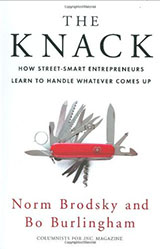My notes on “The Knack – How Street-Smart Entrepreneurs Learn To Handle Whatever Comes Up” by Norm Brodsky and Bo Burlingham
Why are you better off starting a business from scratch rather than buying one?
- It’s harder to learn a business if you haven’t been with it from the start
- You miss out on all the trial-and-error education that happens in the early stages
- You don’t understand key relationships in the business
- You don’t know what to do in emergencies
- You make mistakes that are much costlier than they would have been back when the company was smaller and struggling to get off the ground
How to get more negotiation power for the matter that really matters to you
- Negotiate first about a secondary matter, understanding that, at the end of the process, you’ll probably let the other party get most of what it wants on that issue. Your concession on the first point will give you additional bargaining power when you bring your number one issue to the table.
- In an adversarial negotiation, the best deal is one that leaves both sides a little unhappy
Small business flexibility is a vital strength that you must retain as you grow
- Be flexible when you start your business, be flexible after you built your company.
- No niche lasts forever. If it’s a profitable one, it’s going to attract competitors sooner or later. The more profitable the niche is, the faster it happens.
Are small customers worth the hassle?
- Small customers provide better gross margins because they pay more for services
- Small customers bring stability to a business. If you treat small customers right, they’ll stay with you forever. That’s partly because they’re loyal, and partly because, like most of us, they tend to resist change. And small customers don’t get hunted down and stolen by your competitors
- A base of small customers makes you less vulnerable to the loss of any single customer
Companies who care, get the sale
- Don’t only show customers how you can save them money, show them you care about saving them money. Give away ideas and expertise to build trust
3 reasons not to cut prices to use up excess capacity
- Opportunity costs. If you fill capacity with low-margin sales, you leave no room for high-margin sales
- You are setting up a new competitor – yourself! When you charge two prices for exactly the same service, you are competing against yourself, and it’s only a matter of time before the competitor with the lower price wins. Customers aren’t stupid. They’ll figure out that you’re willing to sell for less. When they do, you’ll have a very hard time getting any of them to pay more
- By then, you have probably lost your current full-price customers. They’ll be furious. They’ll think you’ve been ripping them off all along. Those customers are gone, never to return under any circumstances.
3 ways to manage price increases
- Forgo price increase altogether (mistake!)
- Put them off for as long as possible (mistake!)
- Raise prices a little on a regular basis (actually creates the impression that you are increasing value for money, and small increases don’t hurt too much)
When rules ruin
- Behind every rule there’s almost always a good reason, or at least a good intention. At the time you establish them, the rules appear to make all the sense in the world. But sometimes rules turn off common sense
- Eg: A custom placed a rushed order, and for some reason, the order didn’t arrive on time. The customer would call up, irate, refusing to pay for the delivery. The customer service rep would say “I’m sorry. We made the delivery, and you have to pay for it.” “But it came too late to do us any good,”, the customer would say “we’re not paying.” “Well, you’ll have to speak to a manager” (this is the new rule). The manager would of course waive the charge, but the customer would still be angry because the delivery was late, they were charged anyway, and because a manager had to get involved to get the charge waived. So the customer when away thinking “that damn service stinks”.

Some good home truths there! Certainly a little to think about when it comes to running a business.
When it comes to price increases, nearly every business hates doing it, but nearly every customer doesn’t mind. If you’re actually doing a good job, they have realised your fee is generally a much smaller part of what you add. If you increased too much, but still retained most of your customers, chances are the bought on price to start with, and they probably were looking for an excuse to leave.
Good point Arron 🙂